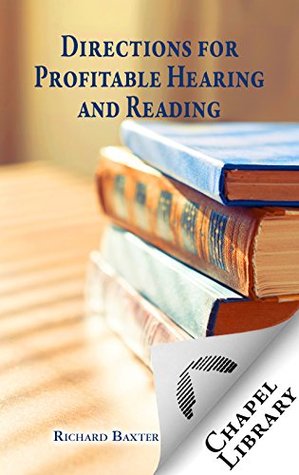Directions for Profitable Hearing and Reading
by Richard Baxter
Another quality eBook from Chapel Library. In Directions for Profitable Hearing and Reading Puritan pastor and author Richard Baxter exhorts readers to take seriously the disciplines of hearing the Word preached, reading the Scriptures, and reading Christian books. It seems that some view hearing a sermon as a passive exercise and therefore miss out on the profit they could gain from it. Baxter highlights the importance of this means of grace and how our approach should reflect a keen appreciation of it. He urges us to come prayerfully, heartily, attentively, and with purpose. He then stirs the reader to a right approach to reading the Scriptures, the attitude with which to approach them, and thoughts on methods of study. He closes with an exhortation on reading Christian books: why to read, what not to read, and what to read.
BUY NOW
Kindle Edition, 95 pages
Published February 17th 2016 by Chapel Library
© 2025 Bibleportal.com 版权所有.

He wrote 168 or so separate works -- such treatises as the Christian Directory, the Methodus Theologiae Christianae, and the Catholic Theology, might each have represented the life's work of an ordinary man. His Breviate of the Life of Mrs Margaret Baxter records the virtues of his wife, and reveals Baxter's tenderness of nature. Without doubt, however, his most famous and enduring contribution to Christian literature was a devotional work published in 1658 under the title Call to the Unconverted to Turn and Live. This slim volume was credited with the conversion of thousands and formed one of the core extra-biblical texts of evangelicalism until at least the middle of the nineteenth century.
Richard Baxter was ordained into the Church of England, 1638, but in two years allied with Puritans opposed to the episcopacy of his church. At Kidderminster (1641-60) he made the church a model parish. The church was enlarged to hold the crowds. Pastoral counseling was as important as preaching, and his program for his parish was a pattern for many other ministers. Baxter played an ameliorative role during the English Civil Wars.
He was a chaplain in the parliamentary army but then helped to restore the king (1660). After the establishment of the monarchy, he fought for toleration of moderate dissent in the Church of England. Persecuted for more than 20 years and was imprisoned (1685) for 18 months, the Revolution of 1688, replacing James II with William and Mary, brought about an Act of Toleration that freed Baxter to express his opinions.
... Show more